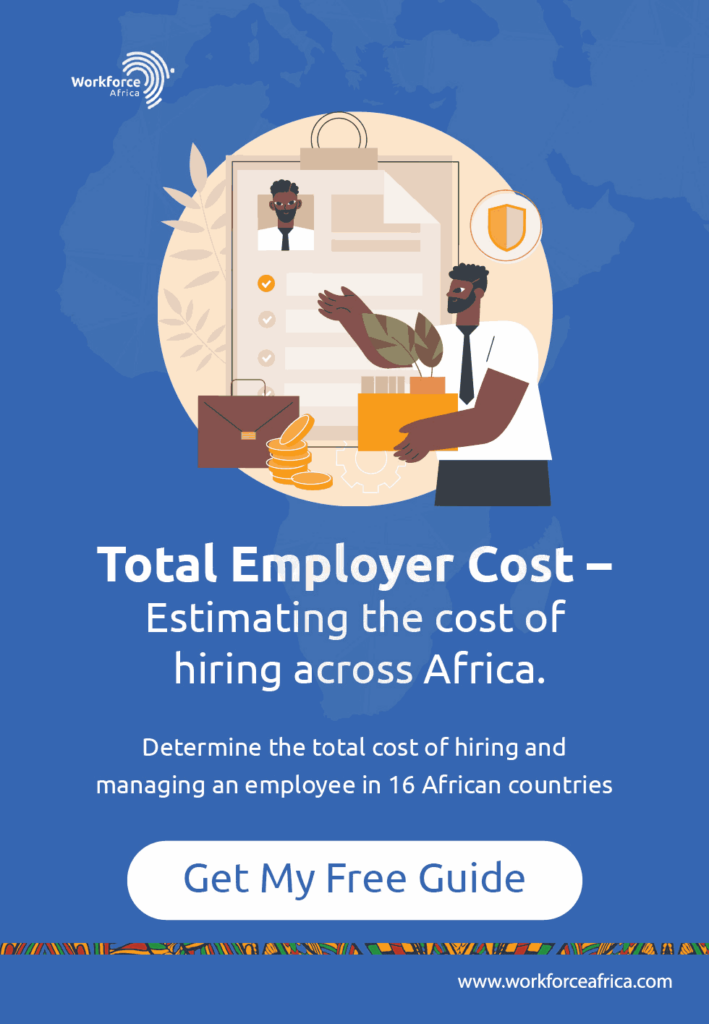

September 6, 2024
This article offers strategic insights into recruiting and managing talent across African countries.
It covers critical hiring practices, legal compliance, and cultural considerations.
This helps nonprofits build diverse, local, and international teams while staying aligned with their mission to create meaningful, sustainable impact.
Hiring employees for a nonprofit organisation is essential for any nonprofit aiming to empower African communities and drive long-term social impact.
With Africa's diverse cultures and unique legal landscapes, nonprofits must navigate complex hiring processes to ensure compliance and effectiveness.
This guide provides global nonprofits with practical advice on recruiting local and international talents.
Also, understanding regional laws, and building a diverse team that reflects the values of inclusion and sustainability.
From setting up a legal entity to addressing global compliance risks, nonprofits will gain the insights they need to expand their reach while respecting the local environment and cultural nuances.
In the context of empowering African communities, building a diverse team is crucial for global nonprofits.
Diversity brings a wealth of viewpoints, fostering innovation and enhancing problem-solving capabilities. Here are some best practices for nonprofit recruitment strategies in Africa
Leverage Local Networks
Partner with local organisations and community groups to reach a wider pool of candidates.
These partnerships can help identify talented individuals who might not be visible through traditional recruitment channels.
Inclusive Job Descriptions
Craft job descriptions that emphasize inclusivity and highlight your commitment to diversity and encourage applications from underrepresented groups.
Understanding Local Contexts
Each African country has unique cultural, social, and economic landscapes.
It's crucial to tailor your nonprofit recruitment strategies to reflect these nuances.
Engaging with local communities to recognise their needs and values ensures your team is representative and culturally sensitive, making you well-prepared for the task.
Respect for Local Customs and Traditions
Understanding and respecting the local culture is crucial in hiring employees for a nonprofit organisation.
For instance, in some African cultures, greeting elders first is standard. This should be considered when conducting interviews or meetings.
Bias-Free Recruitment Processes: Implement structured interviews and standardised evaluation criteria to minimise unconscious bias.
Training hiring managers in diversity and inclusion can also help create a fairer recruitment process.
Offering Development Opportunities
Attracting diverse talent is not just about recruitment but also about retention.
One of nonprofit recruitment strategies is to support employees' growth and foster a nurturing environment by providing professional development and career advancement opportunities.
Suggested Post: 5 Effective Strategies for Creating an Inclusive Workplace
In the mission to empower African communities, leveraging international expertise can significantly enhance the impact of global nonprofits.
Foreign workers bring diverse skills, knowledge, and perspectives that can complement local talent. Here are some best practices for hiring foreign workers in Africa:
Each African country has specific regulations regarding the employment of foreign workers.
Ensure visa, work permit, and labour laws compliance to avoid legal complications. Consulting with local legal experts can provide clarity and guidance.
Equip foreign hires with cultural sensitivity training to help them understand and respect local customs and traditions.
This will foster better integration and collaboration with regional teams and communities.
Establish communication channels to bridge language or cultural barriers.
Regular team meetings, feedback sessions, and open-door policies help maintain transparency and mutual understanding.
Provide robust support systems for foreign workers, including assistance with relocation, housing, and acclimatisation.
Offering mentorship programs can also help them navigate their new environment more effectively.
While foreign expertise is valuable, prioritise sustainable development by investing in local talent.
Encourage foreign workers to mentor and train local staff, ensuring that skills and knowledge are retained within the community.
Setting up a nonprofit entity in African countries is crucial for global nonprofits aiming to empower local communities.
Establishing a legal presence ensures compliance with local laws and enhances the credibility and effectiveness of your operations.
Here are some best practices for setting up a nonprofit entity in Africa:
Research Local Regulations
Each African country has its legal framework for registering nonprofits.
Conduct thorough research to know the specific requirements, including necessary documentation, registration fees, and timelines.
Consulting with local legal experts can provide valuable insights and help navigate the process smoothly.
Choose the Right Legal Structure
Nonprofits recruitmemt strategies can take various legal forms, such as trusts, foundations, or associations.
Select a structure that aligns with your mission, operational needs, and the country's legal environment.
This decision will impact on your governance, tax obligations, and reporting requirements.
Engage Local Stakeholders
Building relationships with local stakeholders, including government officials, community leaders, and other nonprofits, can facilitate the registration process.
Their support and guidance can help you understand local expectations and integrate more effectively into the community.
Prepare Comprehensive Documentation
Ensure you have all required documents, such as your organisation's constitution, bylaws, and proof of funding.
These documents should clearly outline your mission, governance structure, and operational plans.
Compliance and Reporting
Once registered, comply with local laws by adhering to reporting and auditing requirements.
Regularly update your registration status and renew necessary permits to avoid legal issues.
Hiring employees for a nonprofit organisation operating in Africa involves navigating a complex landscape of global compliance risks.
Understanding and mitigating these risks is essential to ensure seamless operations and maintain the integrity of your mission.
Here are some key compliance risks and best practices to address them
Each country has unique laws governing employment contracts, wages, working hours, and termination procedures.
Noncompliance can lead to legal disagreements and financial penalties.
It's crucial to stay informed about local labour laws when hiring employees for a nonprofit organisation and ensure all employment practices adhere to these regulations
Nonprofits must comply with tax regulations in their home and host countries.
This includes understanding tax exemptions, filing requirements, and potential liabilities.
Engaging with tax professionals who specialise in international nonprofit operations can help navigate these complexities.
Hiring foreign workers involves complying with immigration laws, including obtaining the necessary visas and work permits.
Failure to do so can result in fines, deportation of employees, and reputational damage.
Ensure all foreign hires have the appropriate legal documentation before commencing employment.
Handling employee data requires compliance with data protection laws, such as the EU's General Data Protection Regulation (GDPR).
Ensure that personal information is collected, stored, and processed by these regulations to avoid legal repercussions.
In many countries, ensuring a safe working environment is legally required.
Nonprofits must comply with local health and safety regulations to protect employees and avoid liability.
Partnering with Workforce Africa can significantly enhance the hiring process for global nonprofits aiming to empower African communities.
This approach ensures compliance with local regulations and promotes ethical hiring practices.
Here are some best practices for a compliance-driven approach to nonprofit hiring:
Local Expertise and Networks
Workforce Africa offers deep insights into local labour markets, regulations, and cultural nuances.
Leveraging their expertise can help nonprofits navigate the complexities of hiring in different African countries and ensure compliance with local laws and customs.
Regulatory Compliance
Workforce Africa can assist in understanding and adhering to local labour laws, including employment contracts, minimum wage requirements, and working conditions.
This reduces the risk of legal issues and ensures fair treatment of employees.
Pre-payrollStreamlined Recruitment Processes
Partnering with Workforce Africa can streamline recruitment by providing access to a broad talent pool and efficient hiring processes.
We help identify qualified candidates who align with the nonprofit's mission and values while ensuring that all hiring practices comply with local regulations.
Ethical Hiring Practices
Ensuring ethical hiring practices is crucial for maintaining the integrity of the nonprofit sector.
Workforce Africa can help implement fair recruitment processes free from discrimination and bias and promote organisational diversity and inclusion
Ongoing Support and Compliance Monitoring
Workforce Africa provides ongoing support to ensure acquiescence with local laws and regulations.
Constant audits and regulatory checks can help identify and address potential issues, maintaining the nonprofit's reputation and operational effectiveness.
Empowering African communities through nonprofit work requires a strategic approach to building the right team.
Our guide offers a comprehensive solution to navigating Africa's legal, cultural, and compliance landscapes, ensuring that nonprofits can recruit mission-aligned talent with ease and effectiveness.
Ready to strengthen your team and drive meaningful development across Africa?
Contact Workforce Africa today to Schedule a free consultation and discover how you can confidently manage recruitment and compliance while advancing your nonprofit’s mission.